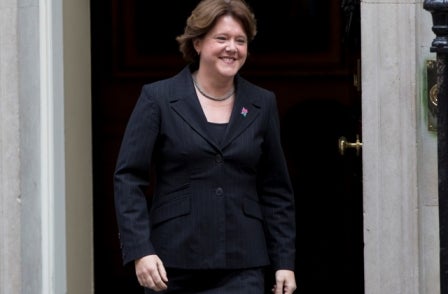
Culture secretary Maria Miller reportedly accepts that the situation where most publishers have signed up to IPSO and none have signed up to the Royal Charter on press regulation could go on for some decades.
This was the view of Erik Bjereger – editor-in-chief of Norway's Kristeligt Dagblad and president of the World Editors Forum – who met her as part of press freedom mission on behalf of the World Association of Newspapers (WAN-IFRA).
It was the first time such a mission has visited the UK.
On Thursday and Friday a number of international editors met politicians including Culture Secretary Maria Miller, publishers and campaign groups ahead of publishing a report later this month.
Bjerger said: “Maria Miller told us that the current situation, where no-one has signed up to the Royal Charter but has instead signed up to IPSO, may last for decades and she would be happy with that as far as I understood her.
“None of the politicians we spoke to expressed regrets concerning the Royal Charter but they did express regret about the extremely confusing process that led to this outcome.”
Most regional and national newspaper publishers have agreed to sign up to the Independent Press Standards Organisation as a replacement body to the Press Complaints Commission. The Independent, Guardian and FT have so far declined to join it because of concerns that it will be controlled by the major press owners.
As it stands IPSO will not comply with the Royal Charter, meaning that members could face punitive costs in libel cases.
Asked what conclusions he had drawn from the mission, Bjereger said: “I’m concerned about two issues. I’m concerned that what will will come out of the Leveson report will eventually open the door in the long term for political control of the press.
“I’m not concerned about the Royal Charter in itself, but I’m concerned about what might be the long-term consequences and about how this is interpreted abroad.
“The other cause of concern is for The Guardian., the British Government and authorities seem to want to intimidate and coerce that newspaper into not publishing more material [about surveillance].”
Asked why an “independent” system of press regulation via a Royal Charter is not preferable to IPSO, which some say would be controlled by a small group of press owners, Bjereger said: “I would say that after 300 years of press freedom in Britain it is quite a dramatic step to introduce the Royal Charter. I don’t see the Royal Charter as such as something which is threatening press freedom in Britain but it is opening the door to legislate and curb the press at a later date.”
He said that reflecting on the mission, the delegation felt that the issue of press regulation was not a “black and white” issue.
“There was a reason for Leveson to hold his proceedings and there has been a public reaction caused by unethical behaviour. But that is not a reason to restrict press freedom.
“Press regulation in many countries is under pressure, and also in my own country. A colleague from Pakistan told me that the argument there is that if Britain could do this they could do it as well.”
Asked how the press freedom mission came about, he said: “We read the newspapers and we were concerned about what was going on in Britain, and that’s why we decided for the first time ever to visit a European country with a long history of press freedom.”
Bjereger said that the issue of the 61 arrests of journalists in the UK over the last two years was also on his agenda.
In a letter to an arrested Sun journalist, WAN-IFRA deputy chief executive Larry Kilman said: “We are very concerned about the charges and the arrests and have included our concerns about them in our protests to the Government and even in a letter to the Queen.”
Email pged@pressgazette.co.uk to point out mistakes, provide story tips or send in a letter for publication on our "Letters Page" blog






